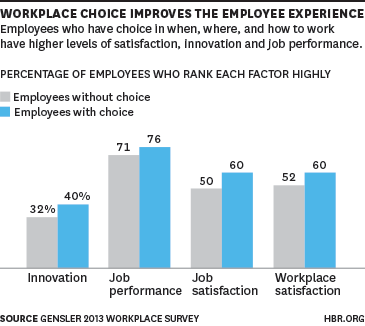In his book Drive: The Surprising Truth About What Motivates Us (the book that convinced me organizational behavior was important), business author Dan Pink identified three major factors that lead to better job performance (when money is no longer an issue): (1) autonomy, (2) mastery, and (3) purpose. A new blog post at Harvard Business Review discusses recent research that provides more support for the notion of autonomy. “An emerging suite of literature and research…clearly points to the power of choice and autonomy to drive not only employee happiness, but also motivation and performance. We found that knowledge workers whose companies allow them to help decide when, where, and how they work were more likely to be satisfied with their jobs, performed better, and viewed their company as more innovative than competitors that didn’t offer such choices.”
The main research comes from Gensler’s 2013 U.S. Workforce Survey. Even more interesting is that workplace autonomy was only one of three major findings from the Gensler Survey:
- Employees who can focus are more effective. “When focus is compromised in pursuit of collaboration, neither works well.”
- Effectively balancing focus and collaboration improves performance.
- Employees with more choice are more effective.
To all the managers in our readership: you might want to check this out.


I really enjoyed Pink’s book.
I worry a tad that he oversells his key idea in the following sense. Giving worker autonomy is consistent with improved business performance for high level jobs and creative industries (“blue ocean” jobs). It has not proven successful in more mundane industries and jobs (“red ocean” jobs)–at least from what I’ve seen. Figuring out a way to improve the life experiences of workers in these red ocean jobs will, I think, be a very important challenge of the next decade or so.
But, again, I really like the book and the ideas, and I think this kind of focus on worker development is a rich and promising movement. (I have a journal article under submission on Mondragon and the idea of worker participation in management and governance….)
I think most of Pink’s suggestions don’t work as well with more mundane industries, as you put it. They were more for knowledge workers and creative industries once money was not longer an issue.
As for your article, how exciting! Keep me updated. Would love to read it.